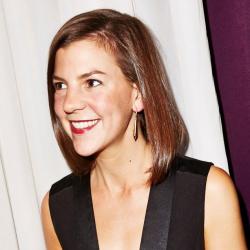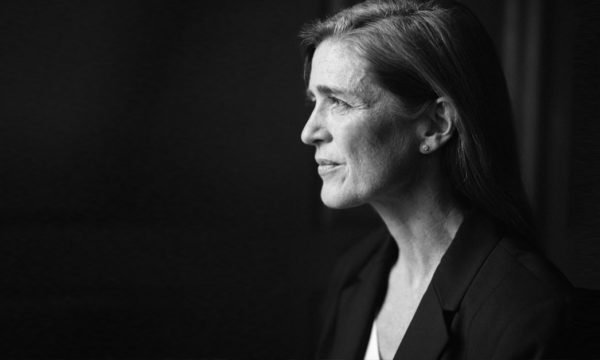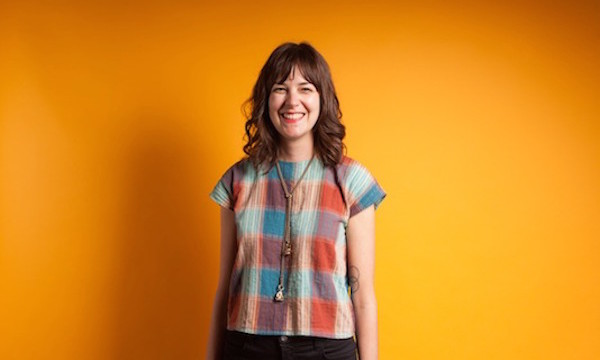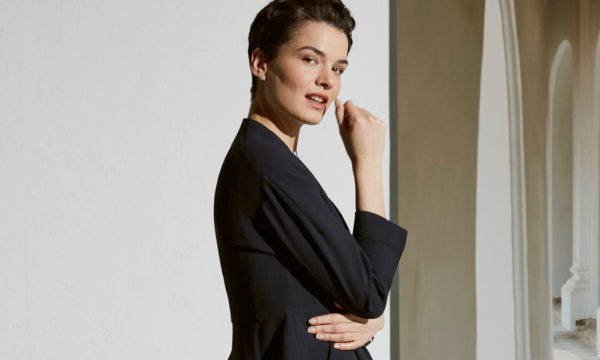Army Veteran Jas Boothe on Homelessness, the Military, and the Power of Oprah
January 25, 2018 | Filed in: Woman of the Week
In 2005, army veteran Jas Boothe found herself homeless after undergoing extensive cancer treatments. She was facing discharge from the military and had nowhere to go with her young son. With the help of an aunt, she got back on her feet, but realized years later that her situation was far more common than she’d thought. In 2010, she founded Final Salute, a Washington, D.C.-based nonprofit committed to providing services and transitional housing to female veterans around the country. To date, they have served over 3,600 women and their children around the U.S. Jas now lives in the D.C. area with her husband and younger son; her older son is in the Air Force. We recently paid her a visit to discuss her career in the military, transitioning to civilian life, and the power of Oprah.
I GREW UP IN A ROUGH PART of Chicago, and it was clear to me that the only way out was through education. I was encouraged by my mother to be a good student, but my home life was challenging. I wrote a book about my stepfather’s abuse, The Princess and the Pedophile, which I hope will help other kids in the same position understand that it’s okay to talk about it. I learned at an early age to always be better than my circumstances.
I GOT A BASKETBALL SCHOLARSHIP to go to college, where I studied television and radio broadcasting. I didn’t really establish friendships as a child because we moved around quite a bit, but my basketball teammates were the first set of friends that I had for an extended period of time, and we still keep in contact today. For me, basketball was strictly a hustle. I hated practicing and I’ve never been a runner. But it was a way to fund my education. I never wanted to be a professional athlete; I just wanted my degree.
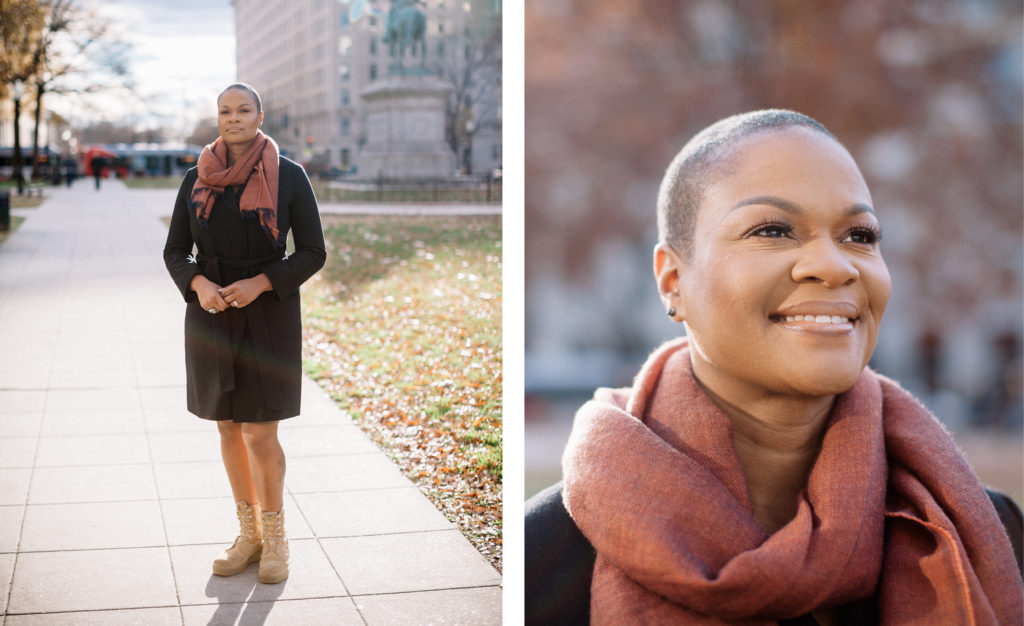
Jas wears the Prospect Puffer in black and the Herringbone scarf in burnt sienna, with her signature combat boots.
MY OLDER SON WAS ABOUT SIX YEARS OLD when I finished undergrad. I needed to support us both, and the military was an attractive option, because I grew up around it. My aunt Melissa was married to a military man, and I had stayed with them during the summers when I was a kid. I didn’t know I was going to become a career soldier. People go in saying, “Hey, I’ll do four years,” and then four turns into eight, and eight turns into 12, and that’s kind of how it was for me.
IT’S NO SECRET THAT WOMEN who serve in the military have challenges, many of which stem from being seen as physically inferior. We’re not viewed as protectors or providers; we’re seen as the damsels, or the support personnel. You could have a woman who is a four-star general like Ann Dunwoody, and then you could have a guy who just works in supply, but he’s more likely to be held in high regard by the other men. Some people will say, “Women shouldn’t be on the front line, because if I’m a 200-pound man and I get shot, she can’t pull me off the battlefield.” But let’s just put this out there: Not every man in the military looks like John Cena. A lot of them look more like Kevin Hart. If I get shot, those guys can’t get me out of there either. But soldiers, male or female, are trained to say, “Let me get a buddy to help drag you out of here.”
IN MY CASE, THESE CONDESCENDING VIEWS almost killed me. When I told my leadership that I was sick, they did not believe me. I was training to go to Iraq, and they said, “This is why women shouldn’t be in leadership positions. You’re just trying to get out of deployment.” It turned out I had head, neck, and throat cancer. I was seen as weak, when in fact I was dying.
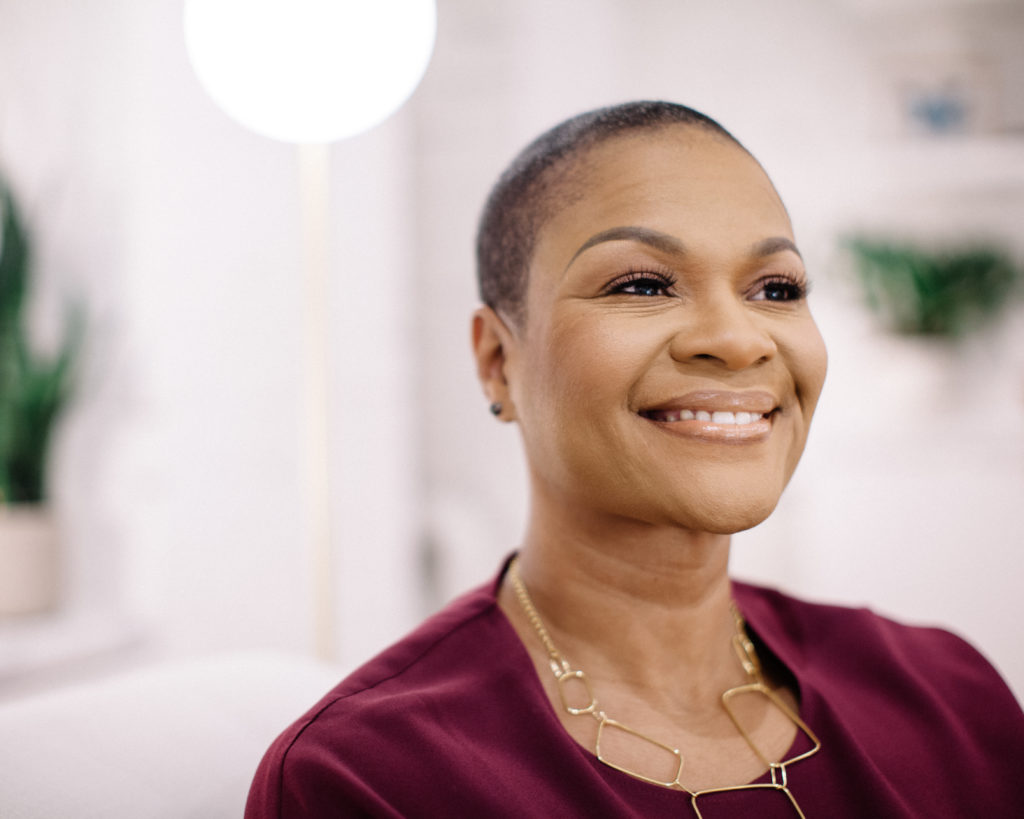
Jas wears the Masha dress in deep plum and the Pandora necklace.
ONCE I WAS DIAGNOSED, the leadership was understanding and supportive. Over six months, I had two surgeries and 30 cycles of radiation. Then I was basically discharged onto the streets. Around the same time as my diagnosis, I lost everything I owned to Hurricane Katrina. I had been stationed in New Orleans before I went into training for deployment; since I wasn’t there when Katrina hit, I couldn’t go and salvage anything, so we lost all our belongings. I really had nowhere to go. I was told that there were no supportive housing services for women veterans with children, and since I had an illegitimate child, I needed to get on welfare and food stamps. I would rather they spat in my face. I’m not saying there’s anything wrong with people who need welfare, because there are people who truly do, but I don’t think a soldier should ever be sent to the welfare office, because we earned our support. We put stock into this country through our service.
LUCKILY, MY AUNT ALLOWED ME to come sleep on her couch with my son. I spent a little while lying around and feeling sorry for myself, and then I noticed that no one was RSVP’ing to my pity party. What really made me get myself back into the world was my son. I taught him that you don’t let your challenges get the best of you, and here I was, being the world’s biggest hypocrite. I didn’t want him to think it was okay to say, “Let the chips fall where they may,” and just accept that life sucks. And so for him, I got up off that couch. Ultimately, I was able to come back on full-time military duty as a human resources officer.
I THOUGHT THAT MY PERIOD OF HOMELESSNESS was an isolated incident, and so after I got back on my feet, I didn’t think much more about it. Then, four years later in 2010, I was watching Oprah, and she had a female veteran on the show who was talking about living in her car after she’d been deployed to Iraq and Afghanistan. I was like, “You have got to be shitting me.” I didn’t realize how many women like me needed help. So I decided to do something about it.
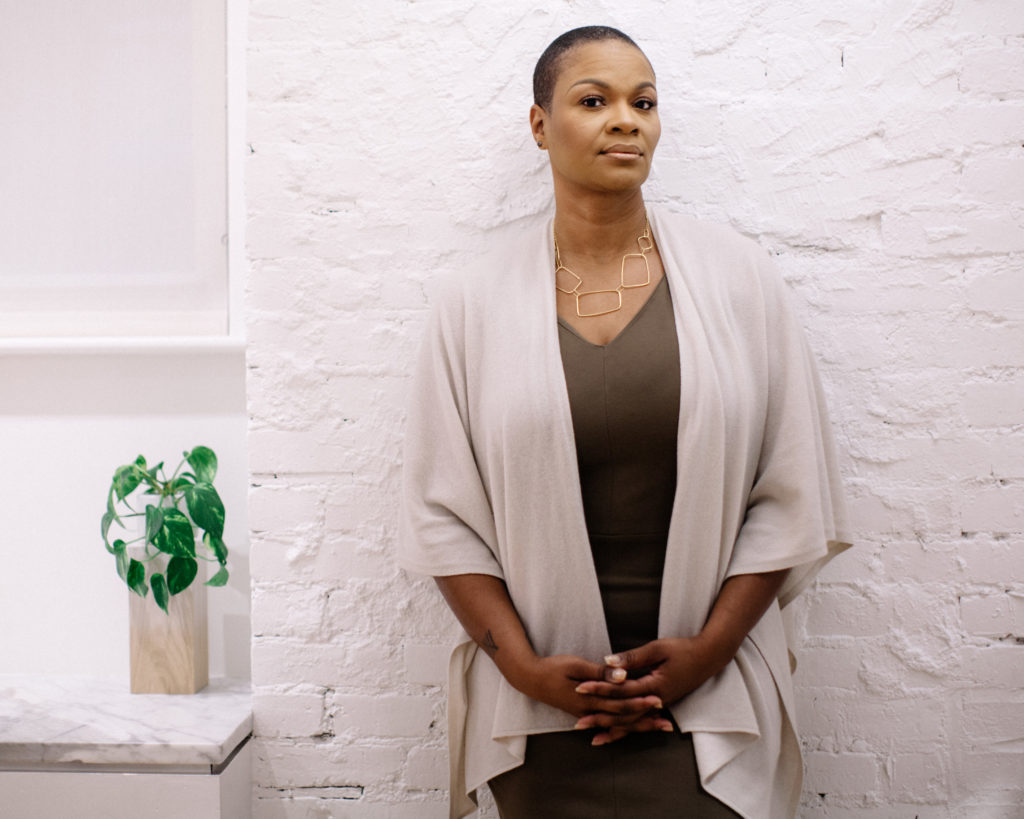
Jas wears the Rachel dress in oak, the Angelou shawl in cream, and the Pandora necklace.
AT FIRST, NO ONE KNEW ABOUT THE EPIDEMIC surrounding homeless women veterans. I was tasked with starting a national conversation. Here are the facts: HUD [the U.S. Department of Housing and Urban Development] reports that there are about 3,000 homeless women veterans, out of about 40-45,000 homeless veterans overall. Out of about 500 shelters run by the VA [the U.S. Department of Veterans Affairs], less than 300 take in women, and only about 15 take women with children. Over 70 percent of the homeless women veteran population have children—so where do they go? Homeless women, especially those with children, have a much higher tendency to couch-surf—moving from home to home with their kids and staying wherever there’s room. Sometimes they sleep in their cars. But the Department of Veterans Affairs and HUD do not recognize couch-surfing as a homeless category. For that reason, the majority of homeless women veterans aren’t counted. They’re scared into silence because they don’t want to lose their kids. But they’re there.
WHEN I STARTED FINAL SALUTE, it was a one-woman show, so I just started going anyplace that would allow me to speak, going to networking groups, or to chambers of commerce. I’d pass out cards and just keep talking. Out of 100 people you talk to, you may get that one who’s actually paying attention and cares. As a nation, we completely missed this problem, and so eventually support started coming in.
A BIG MOMENT OF VALIDATION came when Oprah’s people called me—it was full circle. At first I thought I was getting punked. Oprah was coming to D.C. to honor some women in the area, and I was invited to her show. So I brought a friend and we were sitting there in the audience, and Oprah says, “We’re going to give a standing ovation to this woman who’s doing great things in the D.C. metro area. Where’s Jas Boothe?” My friend had to bump me because I was so stunned. So I went up on stage, and we had a whole conversation that I don’t even remember, because I was like, “Oh my God. You’re Oprah. You’re touching me.”
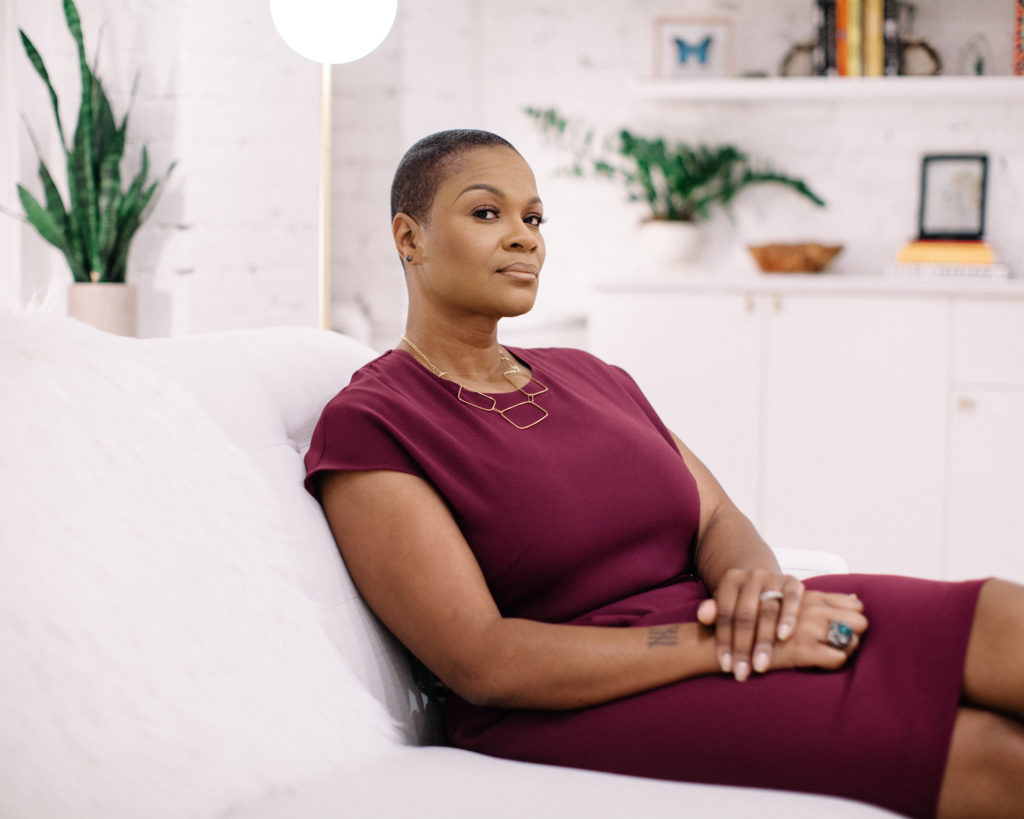
Jas wears the Masha dress in deep plum and the Pandora necklace.
MY AVERAGE DAY IS ORGANIZED CHAOS. I’m a mom, I’m a wife, I’m still a soldier, and I run a non-profit organization, so every day is interesting, and I really feel that I have a purpose. There’s this magnificent fairytale called a work/life balance that does not exist. People are not pie charts. When you say “balance,” that implies that there’s 100% of something that you can divide throughout your day. But I can’t cut up my child or my husband. There’s no 20 percent family, 20 percent business, 20 percent military. Instead, what you have to do is focus 100 percent on whatever you’re doing in the moment. If I’m typing and my younger son is talking to me, I’m not focusing on what I’m typing and I’m not focusing on what he’s saying. Multitasking is a myth.
WHEN I CAME OFF OF ACTIVE DUTY IN 2013, I went to a transition workshop where they help you put together a résumé. I felt like I had a solid product, but then I got my first interview, and I was like, “What am I going to wear? Do I have to put on a dress? What’s business casual? How do I wear my hair?” As a businesswoman and a soldier still transitioning to civilian life, I appreciate MM.LaFleur and the experience they gave me. They took the guesswork out of the process, and didn’t make it intimidating. At first, I was like, “These look like white women’s clothes. Are they going to fit me?” I know that’s a silly thought, because I have plenty of white friends with booties just like mine, but I was worried. Then I went to the showroom appointment, and it was like they knew me already. Everything they picked out fit me perfectly, and they showed me that I could take these three or four pieces and mix and match them to get a full week of outfits.
I HAD ANOTHER INTERESTING EXPERIENCE when I went to one of my first civilian interviews. The interviewer said, “You really need to work on your demeanor. You haven’t smiled once since we met.” I said, “I’m sorry, I didn’t realize that was a job qualification. I didn’t see it anywhere on the description. Do you ask your male candidates to smile more?” Needless to say, we parted ways. But I know that I have a very professional demeanor. I’ve been a soldier my entire career, and we’re expected to be serious. In the civilian workforce, are women just automatically expected to be happy and jubilant all the time? What does that have to do with your job? Unless I’m in public relations, or a door greeter, or working at a comedy show, I don’t think it has anything to do with my capability.
Take a cue from Jas, and nail your next interview with a dress so impressive, it has its own résumé. Shop classic silhouettes here.
Photographs by Rich Gilligan.






